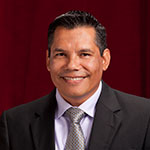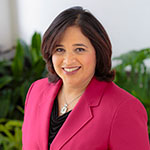His grandfather owned a coffee and tobacco farm in the mountains of Puerto Rico, his father worked with Pan American World Airways for 25 years. Both men taught a young Hector Torres the values of hard work, family, education, integrity, and service to others. He found a valuable mentor in a Jesuit teacher and priest, Father Carsten Martensen, at St. Luke School in the South Bronx, New York, where Torres graduated at the top of his class. “He set a path for me by opening my eyes to the importance of social and economic justice,” says Torres. “Thanks to Father Martensen, I developed an interest in law.”
As an undergraduate, Torres studied economics and political science at the State University of New York at Stony Brook. He also took an opportunity to study abroad at Universidad de los Andes in Bogotá, Colombia. The economic inequality, civil strife, and social injustice rampant in Colombia made him appreciate the legal system in the United States. “I came to admire the indispensable function of the rule of law and the United States’ legal system for peacefully addressing complex legal, social, and economic disputes,” he says.
Torres attended Yale Law School, where he became senior editor of the Yale Law Journal and served as cochairman of the Latino Law Students Association. Upon graduation in 1982, he started his career at Rosenman & Colin, where he worked extensively on antitrust, securities, and other complex commercial matters with renowned litigators Max Freund and Marc Kasowitz. “They placed a lot of emphasis on mastering the facts to master the case,” says Torres of the philosophy that still guides his approach to cases. “By marshaling the facts for a compelling case, with a few highly credible witnesses, you have a solid foundation to construct innovative arguments, increasing the likelihood of favorable outcomes.”
Torres moved with Kasowitz to Mayer Brown, where he continued to work successfully on complex commercial litigation matters. He made partner in the firm in 1991. On July 8, 1993, Torres, Kasowitz, and two other Mayer Brown partners formed Kasowitz, Benson, Torres & Friedman (KBTF). Their first case involved a major product liability litigation on behalf of a large multinational company that supplied engineering resins to the automotive, aerospace, and building industries. One type of resin used in water distribution systems in homes and municipalities worldwide had failed and led to billions of dollars in property damage. Many suits were filed throughout the United States based on allegations that chlorine in drinking water compromised the structural integrity of the resin. Torres and his partners retained leading scientists and experts who demonstrated how the failures came from a flawed engineering design. Torres, seeking the most qualified witness possible, traveled to New Zealand, where he found the inventor of a widely used system that successfully used the same resin but a different design. “Finding the right witness allowed us to mount a defense to a case that otherwise seemed indefensible,” says Torres. “The plaintiffs had a story that was fairly compelling, but we proved that the problems were not attributable to any inherent deficiency in our client’s engineering resin.” The firm’s innovative and aggressive strategy limited the client’s damages in various trials and arbitrations.
With offices in New York, Washington, DC, Los Angeles, Atlanta, Silicon Valley, Miami, San Francisco, Houston, and Newark, New Jersey, KBTF is now one of the largest litigation firms in the country. Torres served as a member of Governor George Pataki’s New York State Judicial Screening Committee for the First Department from 2002 to 2006. He handles top antitrust, intellectual property, securities fraud, product liability, and contract matters in federal and state courts as well as international arbitrations. Currently, he is representing the Ford Motor Company in a global antitrust matter arising over a series of price-fixing and bid-rigging conspiracies.
While Torres works to develop and grow his firm, he also enjoys giving back to his community. He has been working with the St. Luke’s Education Foundation, which funds and supports the school he once attended. “In my recent visits to the school, I felt a drive to open the students’ eyes to options for the future they may not realize they have,” Torres explains. He proposed a mentoring program connecting students with members of a New York City bar association to encourage the kids to continue their education and provide the opportunity for a brighter future. The school board approved the program in 2013, and Torres is working to expand the program to professional alumni in the finance, medical, and engineering fields and to other schools in the South Bronx.

